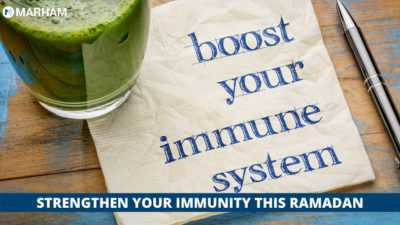Fasting has been linked in many studies to help restore the immune system and fight infection, but some habits can interfere with this during the holy month and do not let you Strengthen Your Immunity This Ramadan. As if fasting for almost 12+ hours during the day and getting up in the middle of the night weren’t difficult enough, Muslims this year, like last, face the additional challenge of keeping their immune systems functioning optimally in the midst of the COVID-19 pandemic. HERE, we are going to discuss strengthening your immunity this Ramadan.


To Sahur or Not to Sahur?
Reiterating that the immune system and the digestive system are the two systems that require the most energy, Fasting allows the body to concentrate its energy on one thing at a time, and thus stopping digestion for a set period of time allows the immune system to get more active. This will make the body to repair cells and fight germs more effectively.
The immune system will be most active between sahur and iftar, but she emphasised the importance of getting up to eat a nutritious sahur meal, no matter how tempted you are to sleep again. If you do not get up for sahur, your body will be stressed as a result of a prolonged period of hunger, which will lead to illness. To know more discuss with a nutritionist.
What Foods to Pick?
When we talk about building a healthy diet during Ramadan, the key is to choose lighter but having filled foods that will help your body replenish all the nutrients you may lose during the day. Set your table with grains, vegetables and fruit, legumes, nuts, dairy or alternatives), and protein sources. It would be ideal to have a nutritious soup, eggs, cheese, olives, greens, cucumbers, and tomatoes (or sahur).
Oatmeal fans may also find it appealing. However eating eggs is one of the most beautiful sources of protein,” with oatmeal, wheat porridge to increase satiety and keep hunger at bay for longer. Make sure your sahur and iftar tables are well-stocked with a variety of foods. Have a large salad as a side dish to your main course at iftar. Salads not only fill your stomach with volume, but they also prevent you from consuming too many calories at once. “The fibre you get from salads will help relieve your intestinal laziness.”
Buy a lot of Antioxidants
Food antioxidants, particularly those found in colourful fruits and vegetables, can help prevent cell damage, thereby boosting the immune system. As a result, eating fruits as a snack between iftar and suhur is highly recommended. Consult with a nutritionist right now.
Fruits are also high in fibre, which helps the digestive system function properly and creates an environment in which beneficial bacteria can thrive in the intestines. Having a large salad as a side dish to your main course at iftar. Salads not only fill your stomach with volume, but they also prevent you from consuming too many calories at once. “The fibre you get from salads will help relieve your intestinal laziness.”


Not all Carbohydrates are Created Equal
During this month, try to avoid fried foods and pastries as much as possible. Bread is the “best quality carbohydrate” over rice, pasta, bulgur, and the traditional “Ramadan pide”,” according to the dietary specialist, so choose wholegrain, sourdough, or einkorn wheat bread over white flour. As tasty and addictive as Ramadan pide is, it is made from white flour, which causes blood sugar spikes; however, admits that once you try it, it is difficult to stop.
Gaining weight quickly and being overweight can also put you at risk for a variety of diseases which includes heart disease and diabetes, and may result in poor COVID-19 outcomes. As a result, dieticians stress the importance of maintaining a healthy weight, especially during Ramadan. Going for a walk after iftar is a great way to aid digestion and reduce bloating.
Drink at Least 1.5 Liters of Water
Water is essential for a healthy immune system because it keeps all of the body’s systems running smoothly. “Water also helps in the removal of chemical toxins from the body, the transport of nutrients to our cells, and the neutralization of bacteria and viruses.” When drinking tea, coffee, or other caffeinated beverages, it is also advised to drink plenty of water.
These drinks may give you the impression that you are getting enough water, but caffeine dehydrates the body and acts as a diuretic, which means it accelerates water excretion from the body. To counteract this effect, some doctors recommend drinking a cup of water for every cup of coffee consumed.
Revisit Probiotics
If there is one drink that people should include in their diets during Ramadan, it is kefir. Kefir has a powerful immune-boosting effect due to the probiotics it contains. “Kefir, which regulates intestinal flora, also aids in the relief of constipation, which is a common problem during Ramadan.” Furthermore, kefir has a low glycemic index and a high protein content, so it keeps you fuller for longer.”


The Question of Exercise
Although exercise may be the last thing on your mind when fasting, doctors recommend at least 30 minutes of physical activity to keep your body in shape, aid digestion, and strengthen your immune system. Reiterating that staying active is one of the most important factors in immunity building, it does so by promoting both physical and mental health. If you do not have any physical limitations, try to walk for 30 minutes every day without overexerting yourself.
Consult the Best Nutritionists in Pakistan
Book an appointment now, to answer all your queries. You can book an appointment with the top nutritionists in Pakistan through Marham by calling at Marham helpline: 0311-1222398 or by online booking facility through the website or Marham mobile app.
Can’t Find The App?
| Android | IOS |
|---|---|
  |
  |
FAQ’s
Can fasting increase immune system?
Many studies on the effects of Ramadan fasting on the immune system have revealed that fasting can restore the immune system (20, 40). Fasting for at least three days allows the body to begin producing new white blood cells, which revitalises the immune system and prepares it to fight infection.
How long should I fast to reset my immune system?
Fasting for 30 days has been shown to stimulate the production of new white blood cells. It is the foundation for the regeneration of the entire immune system.
Does fasting help your body?
Fasting, in essence, cleanses our bodies of toxins and forces cells into processes that are not normally stimulated when a steady supply of fuel from food is always available. When we fast, the body does not have normal access to glucose, forcing the cells to produce energy through other means and materials.

